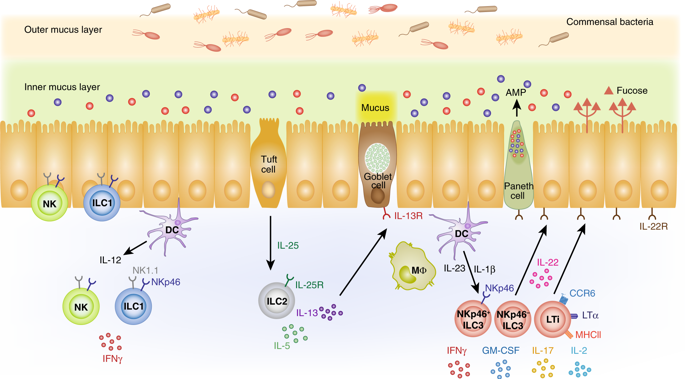当前位置:
X-MOL 学术
›
Mucosal Immunol.
›
论文详情
Our official English website, www.x-mol.net, welcomes your
feedback! (Note: you will need to create a separate account there.)
The role of innate lymphoid cells in response to microbes at mucosal surfaces.
Mucosal Immunology ( IF 7.9 ) Pub Date : 2020-02-11 , DOI: 10.1038/s41385-020-0265-y Goo-Young Seo 1 , Daniel A Giles 1 , Mitchell Kronenberg 1, 2
Mucosal Immunology ( IF 7.9 ) Pub Date : 2020-02-11 , DOI: 10.1038/s41385-020-0265-y Goo-Young Seo 1 , Daniel A Giles 1 , Mitchell Kronenberg 1, 2
Affiliation

|
Innate lymphoid cells (ILCs) are a lymphocyte population that is mostly resident at mucosal surfaces. They help to induce an appropriate immune response to the microbiome at homeostasis. In healthy people, the mucosal immune system works symbiotically with organisms that make up the microbiota. ILCs play a critical role in orchestrating this balance, as they can both influence and in turn be influenced by the microbiome. ILCs also are important regulators of the early response to infections by diverse types of pathogenic microbes at mucosal barriers. Their rapid responses initiate inflammatory programs, production of antimicrobial products and repair processes. This review will focus on the role of ILCs in response to the microbiota and to microbial infections of the lung and intestine.
中文翻译:

先天性淋巴细胞在粘膜表面对微生物的反应中的作用。
先天性淋巴样细胞 (ILC) 是主要位于粘膜表面的淋巴细胞群。它们有助于在体内平衡时诱导对微生物组的适当免疫反应。在健康人群中,粘膜免疫系统与构成微生物群的生物共生。ILC 在协调这种平衡方面发挥着关键作用,因为它们既可以影响微生物群,又可以反过来受到微生物群的影响。ILC 也是粘膜屏障处对不同类型病原微生物感染的早期反应的重要调节剂。它们的快速反应启动了炎症程序、抗菌产品的生产和修复过程。本综述将重点关注 ILC 在响应微生物群以及肺和肠道微生物感染中的作用。
更新日期:2020-02-11
中文翻译:

先天性淋巴细胞在粘膜表面对微生物的反应中的作用。
先天性淋巴样细胞 (ILC) 是主要位于粘膜表面的淋巴细胞群。它们有助于在体内平衡时诱导对微生物组的适当免疫反应。在健康人群中,粘膜免疫系统与构成微生物群的生物共生。ILC 在协调这种平衡方面发挥着关键作用,因为它们既可以影响微生物群,又可以反过来受到微生物群的影响。ILC 也是粘膜屏障处对不同类型病原微生物感染的早期反应的重要调节剂。它们的快速反应启动了炎症程序、抗菌产品的生产和修复过程。本综述将重点关注 ILC 在响应微生物群以及肺和肠道微生物感染中的作用。











































 京公网安备 11010802027423号
京公网安备 11010802027423号